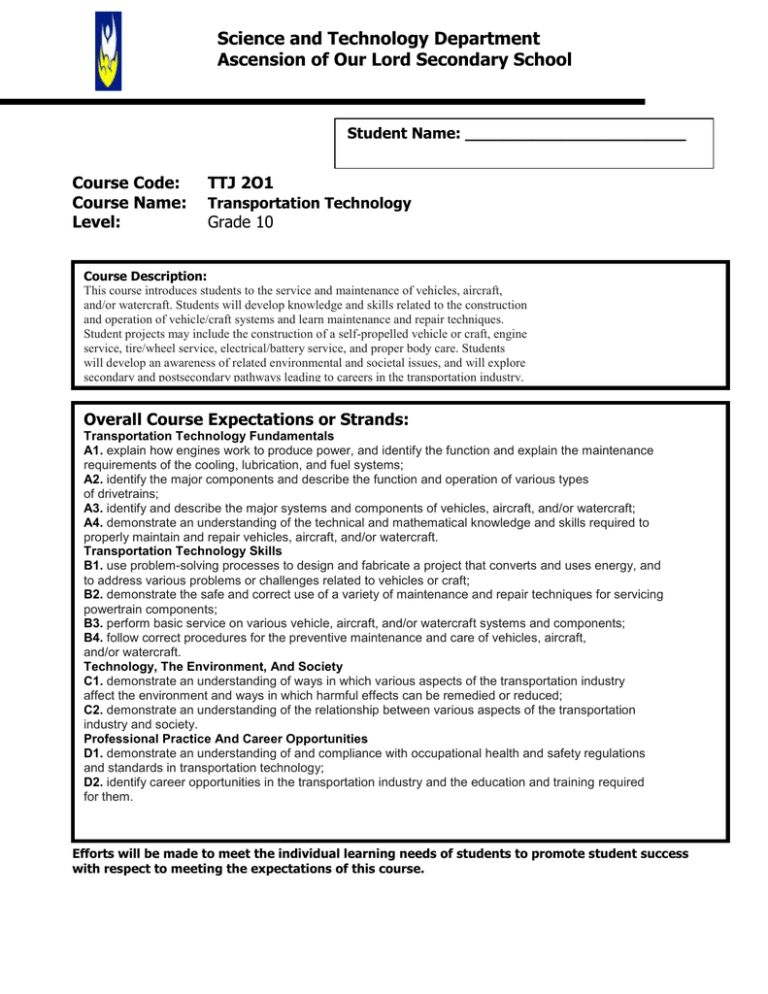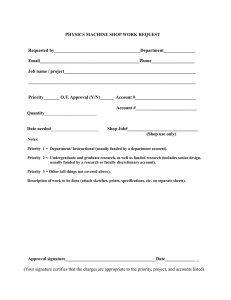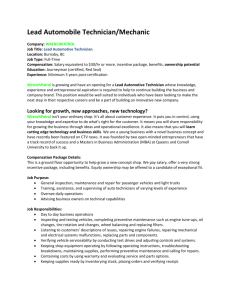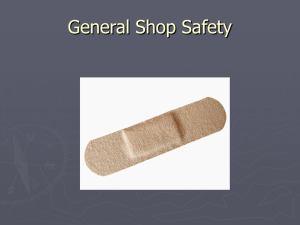Science and Technology Department Ascension of Our Lord Secondary School Course Code:
advertisement

Science and Technology Department Ascension of Our Lord Secondary School Student Name: _______________________ Course Code: Course Name: Level: TTJ 2O1 Transportation Technology Grade 10 Course Description: This course introduces students to the service and maintenance of vehicles, aircraft, and/or watercraft. Students will develop knowledge and skills related to the construction and operation of vehicle/craft systems and learn maintenance and repair techniques. Student projects may include the construction of a self-propelled vehicle or craft, engine service, tire/wheel service, electrical/battery service, and proper body care. Students will develop an awareness of related environmental and societal issues, and will explore secondary and postsecondary pathways leading to careers in the transportation industry. Overall Course Expectations or Strands: Transportation Technology Fundamentals A1. explain how engines work to produce power, and identify the function and explain the maintenance requirements of the cooling, lubrication, and fuel systems; A2. identify the major components and describe the function and operation of various types of drivetrains; A3. identify and describe the major systems and components of vehicles, aircraft, and/or watercraft; A4. demonstrate an understanding of the technical and mathematical knowledge and skills required to properly maintain and repair vehicles, aircraft, and/or watercraft. Transportation Technology Skills B1. use problem-solving processes to design and fabricate a project that converts and uses energy, and to address various problems or challenges related to vehicles or craft; B2. demonstrate the safe and correct use of a variety of maintenance and repair techniques for servicing powertrain components; B3. perform basic service on various vehicle, aircraft, and/or watercraft systems and components; B4. follow correct procedures for the preventive maintenance and care of vehicles, aircraft, and/or watercraft. Technology, The Environment, And Society C1. demonstrate an understanding of ways in which various aspects of the transportation industry affect the environment and ways in which harmful effects can be remedied or reduced; C2. demonstrate an understanding of the relationship between various aspects of the transportation industry and society. Professional Practice And Career Opportunities D1. demonstrate an understanding of and compliance with occupational health and safety regulations and standards in transportation technology; D2. identify career opportunities in the transportation industry and the education and training required for them. Efforts will be made to meet the individual learning needs of students to promote student success with respect to meeting the expectations of this course. Course Timeline: Unit 1: Introduction and Shop Safety Unit 2: Tools and Fasteners Unit 3: Introduction to Engines Unit 4: Vehicle Sections and Systems Unit 5: Design and Fabrication – CO2 Car* * Unit 5 will be the summative culminating project Culminating Summative Tasks will be administered towards the end of the course and will be weighted at 30% of the final mark. Specific activities will be detailed later in the course. All timelines as stated are approximate. Major Topics and Projects Introduction to Technology and Transportation Structure and design – bridge building project Safety and shop routines, Automobile safety Shop Layout project Tools and Fastener Theory Skill development projects: threading project, soldering, gasket making Small Engine project and engine theory: - major engine components - four stroke cycle and engine operation - gaskets and seals - cooling systems - lubrication systems - air and fuel system basics - bearings Automobile projects Vehicle Maintenance – basic oil change and inspection Sections of an automobile - Automobile design and construction, basic sections of an automobile Wheels and tires Brake system theory Careers in industry Problem solving and design – CO2 Car design project Other Course Requirements Students are expected to keep a neat and up-to-date note book for this class. Note books will be kept in the classroom. Students are required to participate in shop clean up everyday. Students must clean up after themselves and return all tools, parts and materials to their proper location at the end of each work period. Clean up is an integral part of the expectations for this course and will be reflected in the student’s marks. Students are expected to be on time for class everyday and prepared for class. Tardiness and unexplained absences will be met with in class consequences and referral to the VicePrincipal. Resources: The course will use a variety of resources which will be distributed to students as they are required. All textbooks will remain in the classroom, but can be signed out if necessary to complete assignments at home. Students will be responsible for the care and condition of the textbooks. Resources for this course include: Automotive Technology –A Systems Approach 4th edition, - Erjavec - Thompson-Delmar Automotive Fundamentals, 5th edition – Nash – McGraw Hill Ryerson Automotive and small engine shop manuals. This information includes step by step procedures that are required to perform repairs to the majority of vehicles and small engines in use today. Any damage incurred will result in payment for replacement. Automotive Technology- A Systems Approach - $120.00 Automotive Fundamentals - $80.00 Automotive Service Manuals - $30.00-$120.00 SAFETY Students will be instructed on all aspects of shop safety. Students are expected to be attentive to all safety instruction, read all shop and classroom safety rules, and adhere to all shop, tool and equipment safety rules. SAFETY PASSPORT A safety passport system is used in the Transportation Technology class that requires all students to sign a passport acknowledging that they have received instruction and demonstrated proper use of each tool and machine they will be using. The passport also requires students to achieve a minimum of 80% on any related safety tests. Students will not be allowed to use any tools or equipment if they have not signed the passport. Students must also return the attached Shop Safety Agreement, signed by both student and parent/guardian before any shop projects can begin. This form must be returned within the first week of the course. Evaluation Policies 1. Student marks will be determined by evaluating process & product according to 4 categories (see below) & 4 levels of the Achievement Chart as found in the Ministry Policy document for Mathematics. Evaluation Structure:: Knowledge/Understanding Application Communication Thinking/Inquiry 20% 40% 20% 20% Term Evaluations = 70% of the final mark. Final Evaluation = 30% of the final mark. Final Evaluations will include: Final written exam -15%, Summative Task – 15% 2. Feedback will also be provided for student learning skills. Responsibility, organization, independent work, collaboration, initiative, and self-regulation are assessed apart from student achievement in the four categories outlined above and will conform to the coding: (refer to www.dpcdsb.org/ASCEN for more details) E – Excellent G – Good S – Satisfactory N - Needs Improvement 3. Assignments submitted after the due date established by the teacher will receive a penalty in accord with our Board Assessment & Evaluation Policy Document as outlined in the student agenda. 4. Should a student miss an evaluation due to a legitimate absence, in accord with our Board A&E Policy Document, the student and teacher will make arrangements to address the missed evaluation in a timely manner. In the cases of extended vacation or prolonged absence, consultation with the appropriate administrator is required. 5. In the event that the student does not make up the missed evaluation(s), a zero may be assigned. If it is determined that the evaluation(s) has/have been missed as a result of a skip/truancy or has/have been plagiarized, a zero may be assigned. 6. For all other cases of absence and/or missed evaluations (including absence during the final examination period), please refer to our Board A&E Policy as outlined in the student agenda. May God bless your efforts this semester! To be signed and returned within the first week of classes Student and Parent/Guardian are to sign this page and the following safety agreement after fully reading this course outline, and return both to Mr. Beaton no later than September 8th. I have read and understand the course outline for Transportation Technology TTJ 2O1 (Grade 10 Open), and I understand my responsibilities and the course expectations. Student Name (please print):_______________________ Student signature: ________________________________ Date: ______________ Parent signature: ________________________________ Date: _______________ Parent contact phone #: day: ___________________ evening: _______________ Parent contact e-mail: ___________________________________________ Transportation Technology Shop Safety [from the Ontario Ministry of Education Technological Education, The Ontario Curriculum, Grades 11 and 12, 2000, page 200] “Health and safety are of paramount importance in technological education programs. As part of every course, students must be made aware that health and safety are everyone’s responsibility – at home, at school, and in the workplace. Before using equipment, students must be able to demonstrate knowledge of the equipment being used and the procedures necessary for its safe use. Personal protective gear should be worn as appropriate. At Ascension of Our Lord Secondary School, Students are expected to complete all written and practical safety assignments, and know and follow all shop safety rules on a daily basis. Student Conduct Agreement I, agree to: Ensure a safe workplace 1. Inform teachers of all injuries, damaged tools and potentially dangerous situations. 2. Make sure I know all fire exits and power shutdown switches and how to use them during emergency situations. 3. Not compromise the safety of others through horseplay or aggressive action. 4. Only use equipment when properly trained, always with any necessary personal protective equipment, and when I fully understand all related safety issues 5. Ask for assistance from the teacher when I am unsure of the proper procedures or health and safety issues Prescribed and Non-prescribed Medications 1. Report any use of prescription medications and will inform teachers of any possible side effects of the medication [e.g. penicillin, Phenobarbital etc.] 2. Report any use of non-prescription medication and any possible side effects of the medication [e.g. Reactine, Benadril, any cough syrups etc.] 3. Never enter a shop or lab carrying, or under the influence of illegal substances Consequences for Improper Action I understand that failure to comply with this agreement may result in injury to myself or others, and that failing to comply with safety procedures may result in my temporary or permanent removal from the class or shop. I have read the above and understand the expectations and consequences. Student signature: ______________________ Parent’s signature ______________________ Date: ______________________



